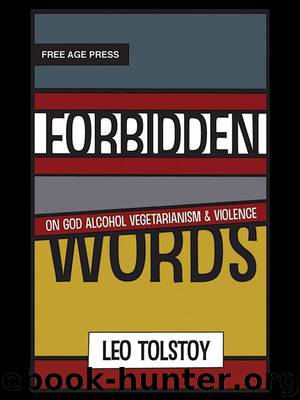Forbidden Words by Leo Tolstoy

Author:Leo Tolstoy [Tolstoy, Leo]
Format: epub
Tags: Communism, Peta, God, Kingdom of God, Arthur Schopenhauer, Letter to a Hindu, Genius Alive, A Confession, Yasnaya Polyana, War and Peace, Vegan, Sermon on the mount, Vegetarianism, Chertkov, Conversations with Leo Tolstoy, Bible, Count Leo Tolstoy, Vegetarian, Pacifism, My Religion, Free Age Press, Gandhi, Pacifist, Anna Karenina, Russia, The Gospel in brief, Non violence, What I believe, non resistance, On Life, Martin Luther King, Anti War, Jesus Christ, White Poppy, Christianity. A Confession, Peace movement, Russian Orthodox Church, Russian Revolution, The last station
Publisher: White Crow Productions Ltd
Published: 2010-05-18T16:00:00+00:00
The First Step – Introduction
In 1892, Tolstoy wrote The First Step as a preface to the Russian publication of The Ethics of Diet by Howard Williams; a book which offers a series of historical witnesses to the efficacy of the vegetarian lifestyle from Buddha and Pythagoras to Schopenhauer and Rousseau.
Tolstoy himself had supposedly been converted to the vegetarian cause by a single conversation with William Frey, one afternoon in 1885. Frey had spoken of the inevitability of vegetarianism and the naturalness of such a diet. Tolstoy had thought for a moment, and then declared: ‘Yes, my friend, you are quite right. Thanks, thanks for your wise and honest words! I will certainly follow your example and abandon flesh-meat.’
The First Step is a piece of writing in search of the moral man, and tilts at many targets along the way. But the heart of the matter is a ‘sequence of qualities’ which a man must possess to live the good life. For Tolstoy, the first of these qualities is self-control; and the first form of self-control relates to food. Fasting is duly applauded, and then comes the famous description of the workings of the Tula slaughterhouse. It is explicit and disturbing in its description of animal killing; and effectively implicates the reader in the violence of the slaughter.
‘This is dreadful!’ he wrote. ‘Not the suffering and the death of the animals, but that people suppress in themselves, unnecessarily, the highest spiritual capacity – that of sympathy and pity towards fellow creatures like themselves – and by violating their own feelings, become cruel. And how deeply seated in the human heart is the injunction not to take life.’
Tolstoy’s vegetarianism was part of his holistic sense of meaning in the world; for him, one moral discovery led to another, and bravely, he tried to follow each leading, wherever the path went. As one writer said, reflecting on his conversation with Frey: ‘His diet from then on left no creature miserable and his own soul closer to honesty.’
Download
This site does not store any files on its server. We only index and link to content provided by other sites. Please contact the content providers to delete copyright contents if any and email us, we'll remove relevant links or contents immediately.
| African | Asian |
| Australian & Oceanian | Canadian |
| Caribbean & Latin American | European |
| Jewish | Middle Eastern |
| Russian | United States |
4 3 2 1: A Novel by Paul Auster(12377)
The handmaid's tale by Margaret Atwood(7757)
Giovanni's Room by James Baldwin(7330)
Asking the Right Questions: A Guide to Critical Thinking by M. Neil Browne & Stuart M. Keeley(5762)
Big Magic: Creative Living Beyond Fear by Elizabeth Gilbert(5756)
Ego Is the Enemy by Ryan Holiday(5415)
The Body: A Guide for Occupants by Bill Bryson(5082)
On Writing A Memoir of the Craft by Stephen King(4935)
Ken Follett - World without end by Ken Follett(4723)
Adulting by Kelly Williams Brown(4566)
Bluets by Maggie Nelson(4548)
Eat That Frog! by Brian Tracy(4526)
Guilty Pleasures by Laurell K Hamilton(4439)
The Poetry of Pablo Neruda by Pablo Neruda(4098)
Alive: The Story of the Andes Survivors by Piers Paul Read(4023)
White Noise - A Novel by Don DeLillo(4006)
Fingerprints of the Gods by Graham Hancock(3996)
The Book of Joy by Dalai Lama(3976)
The Bookshop by Penelope Fitzgerald(3844)
